May 21, 2025 | 05:52 GMT +7
May 21, 2025 | 05:52 GMT +7
Hotline: 0913.378.918
May 21, 2025 | 05:52 GMT +7
Hotline: 0913.378.918
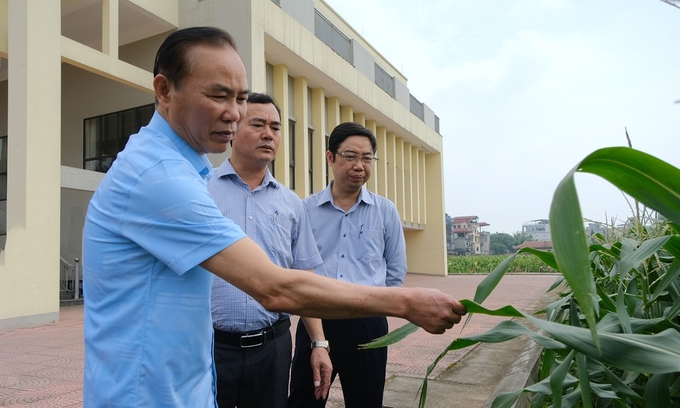
Deputy Minister Phung Duc Tien highly appreciated the glorious history of the Maize Research Institute. Photo: Bao Thang.
On May 5, Deputy Minister Phung Duc Tien led a delegation of the Ministry of Agriculture and Rural Development (MARD) to visit and work at the Maize Research Institute (MRI).
Sharing with MRI’s leaders and staff, Deputy Minister Phung Duc Tien emphasized maize’s importance in ensuring national food security as well as contributing to the development of animal husbandry in recent years.
"MRI has attained a glorious history. It is necessary for us to be more proactive in autonomous activities to inherit the achievements of the previous generations," said the Deputy Minister.
Receiving comments from the Deputy Minister, Director of the National Agricultural Extension Center Le Quoc Thanh recalled the memory of about ten years ago. At that time, for many agricultural staff, becoming a member of MRI was really a "dream".
According to Mr. Le Quoc Thanh, maize in the past was not only a food crop but also an economic crop and a commodity. In areas such as Son La, maize has paved the way for people to develop their economies, creating a premise for the fruit tree area to achieve its present development. "Maize is really a tree to eliminate hunger and reduce poverty, even enriching the Son La people," he said.
In recent years, MRI has also developed another mission, which is to transfer biomass maize seeds to help cattle herds in mountainous areas avoid hunger and cold.
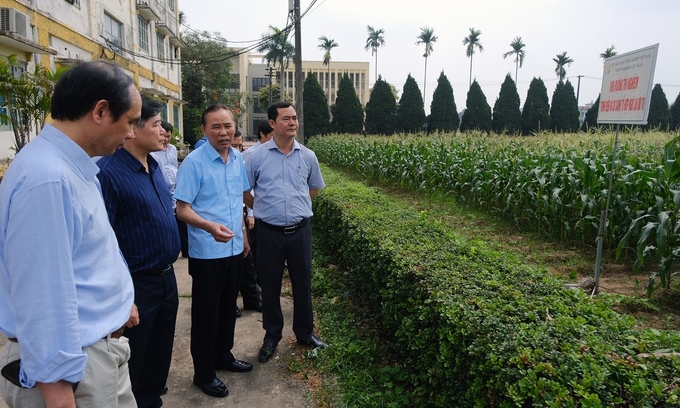
The MARD’s delegation visited the MRI’s experimental field. Photo: Bao Thang.
As a partner with MRI, representatives of the National Agricultural Extension Center said that Vietnamese maize should compete in the "niche market." Instead of competing in the grain maize market, we can compete in the biomass maize market, which is widely grown in the northern provinces.
"Research on maize not only focuses on seed but also needs to be placed in a whole value chain farming system. Currently, there is still a lot of spare ground for biomass maize in the winter crop. Besides, we also need to pay attention to researching different technical solution packages for each maize product, such as smoothie maize and maize for fast food," said Director Le Quoc Thanh.
Reporting to the MARD’s delegation, Mr. Nguyen Xuan Thang, Director of the Maize Research Institute, said that since September 2005, the Institute has become a member of the Vietnam Academy of Agricultural Sciences. Experiencing over 50 years of construction and development, the Institute has received many noble awards, such as: the title of "Hero of Labor in the Renovation Period" in 2005; the Third-Class Independence Medal in 2013; three First, Second, and Third-Class Labor Medals; four Vietnam Golden Rice Awards at the Can Tho International Agricultural Fair; two VIFOTEC Awards; and dozens of other awards.
Up to now, the institute has 157 cadres, officials, and employees, of whom 100 are payroll employees, 12 are self-paying staff, and 45 are contract laborers. In terms of qualifications, the institute currently has 13 PhDs.
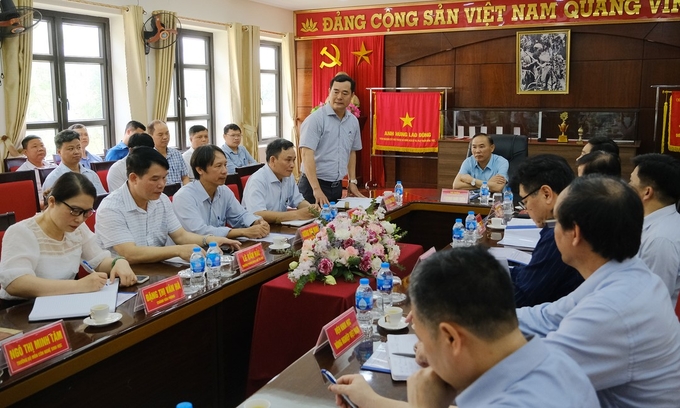
Director Nguyen Xuan Thang reported the results of activities and some key tasks in the coming time. Photo: Bao Thang.
In the 2016–2020 period, the Institute implemented three projects with a total investment of more than VND 70 billion. In the 2020–2022 period, the Institute has been presiding over 27 science and technology tasks, including one state-level topic, 12 agricultural extension topics and projects, and ministerial-level production trial projects; one project to strengthen equipment at ministerial level; three regular tasks; four projects at local and grassroots levels; and seven projects in collaboration with other units, with a total budget of nearly VND 30 billion (excluding regular tasks).
"Most of the new seeds, after being recognized for circulation, have been transferred for production. In the 2020–2022 period, the Institute has 15 maize seeds that have been recognized for circulation and 17 maize seeds that have been extended for circulation. In the period of 2020–2022, the Institute has signed a contract to transfer the distribution rights of 23 new single hybrid maize seeds," said Director Nguyen Xuan Thang.
On average, annually, about 2,500–3,000 tons of maize seeds researched and selected by the Institute are provided for production, accounting for about 15–20% of the national hybrid maize market share.
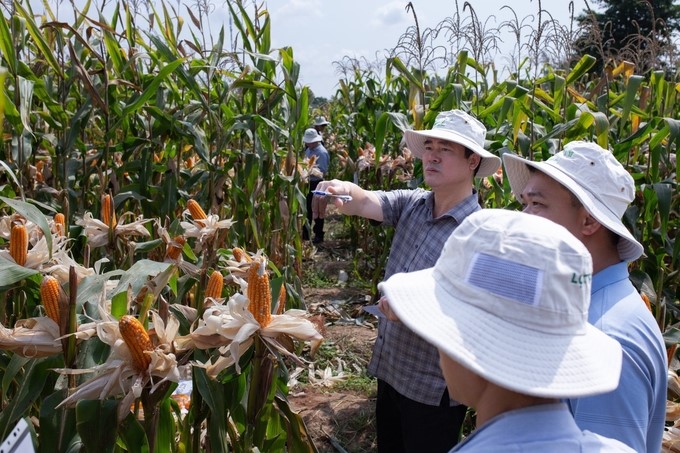
The Director of the Maize Research Institute, Mr. Nguyen Xuan Thang, went to the maize field to direct and check the seed quality when planting on a large scale.
Expressing great gratitude for the attention and help of MARD and other units, the MRI’s Director pointed out some difficulties, such as the fact that the salary fund and operating budget tend to decrease gradually, the actual income of employees faces difficulties, and many researchers are not satisfied with their work, resigning or applying for a job transfer.
In addition, the institute's infrastructure is still lacking compared to the demand; the state does not allocate enough non-business expenditure sources for capital construction; there is a shortage of qualified human resources with specialization in genetics, breeding, and biotechnology; and the demand for domestic production and consumption of maize seeds is continuously decreasing because the price of domestically produced maize is much higher than the price of imported maize.
On behalf of MRI, Director Nguyen Xuan Thang proposed that MARD supplement the Institute's scientific tasks according to the biotechnology program, seed project, etc., chaired by the Ministry.
Concluding the working session, Deputy Minister Phung Duc Tien encouraged MRI’s staffs to uphold the spirit of autonomy in the market economy, especially financial autonomy.
"Private businesses have to rent land, spend money to buy equipment, and hire high-quality human resources, but they still look for ways to compete. State-invested research institutes in all aspects have to strive harder," expressed Deputy Minister.
Calling scientists to change their thinking and conduct research in association with the market, the leaders of the Ministry of Agriculture and Rural Development said that the Maize Research Institute as well as other non-business units need to accept the market mechanism in the present time. He conceived: "The director must be like the master, looking for work for the employees."
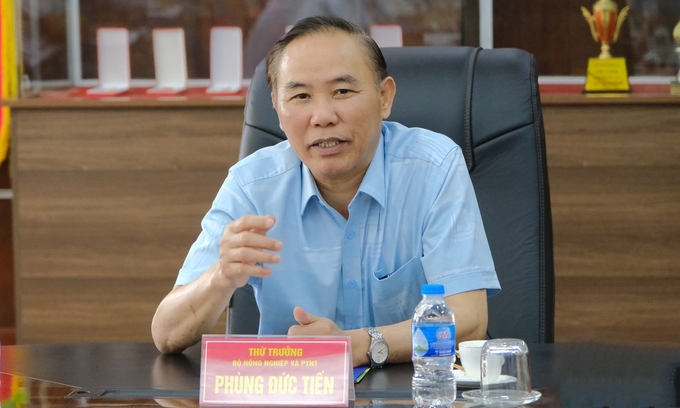
Deputy Minister Phung Duc Tien encouraged the MRI’s staff to actively explore new development directions. Photo: Bao Thang.
On that basis, Deputy Minister Phung Duc Tien suggested some orientations for the institute in the coming time. The first is to choose the right seed for the market; high-yielding maize must have a different market segment than high-quality maize. Similarly, tolerant seeds that can adapt to extreme conditions also need a separate market.
The second is about technology. The Deputy Minister suggested that the MRI’s staff, using existing genetic materials, continue to make breakthroughs, such as converting the whole genome instead of editing one or a few genes.
Along with that, the Maize Research Institute needs to strengthen international cooperation. Through his experience while working at the National Assembly Committee on Science, Technology, and Environment, the Deputy Minister said that many international organizations are looking for opportunities for cooperation and investment in Vietnam. Therefore, the Institute should actively seek to connect, either directly or through the advice of the Department of International Cooperation.
"Maize is gradually becoming a commodity product, even a product of high economic value. Maize researchers, therefore, need to transfer more technical advances into production," the Deputy Minister emphasized.
Mr. Dao The Anh, Deputy Director of the Vietnam Academy of Agricultural Sciences, shared that Vietnam has taken the initiative in maize seed technology. Therefore, the Corn Research Institute has performed well in technology transfer, making an important contribution to the institute's autonomous operation.
Translated by Huyen Vu Thu

(VAN) Japan's grant aid project contributes to capacity building, promoting organic agricultural production, and fostering sustainable community development in Dong Thap province.

(VAN) For years, the CRISPR-Cas9 genome technology has been reshaping genetic engineering, a precision tool to transform everything from agriculture to medicine.

(VAN) Vietnam aims to become a 'leader' in the region in the capacity and managing effectively soil health and crop nutrition.
![Reducing emissions from rice fields: [Part 1] Farming clean rice together](https://t.ex-cdn.com/nongnghiepmoitruong.vn/608w/files/news/2025/05/05/z6509661417740_a647202949c539012a959e841c03e1d3-nongnghiep-143611.jpg)
(VAN) Growing clean rice helps reduce environmental pollution while increasing income, allowing farmers to feel secure in production and remain committed to their fields for the long term.
/2025/05/19/5136-1-144800_230.jpg)
(VAN) The Nghe An Provincial People's Committee has just approved the list of beneficiaries eligible for revenue from the Emission Reductions Payment Agreement (ERPA) in the North Central region for the year 2025.

(VAN) 14 out of 35 domesticated elephants in Dak Lak province have had their living conditions improved, with 11 of them currently participating in the non-riding elephant tourism model.

(VAN) Muong Nhe Nature Reserve hopes that being upgraded to a national park will lay the foundation for forest protection efforts to be carried out in a systematic, modern, and sustainable manner.